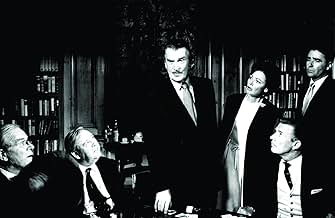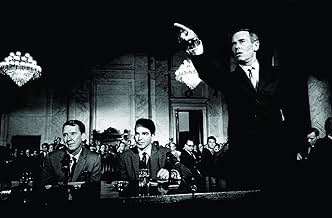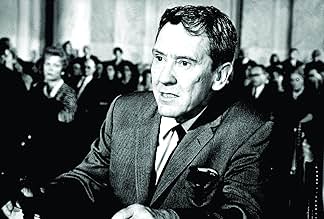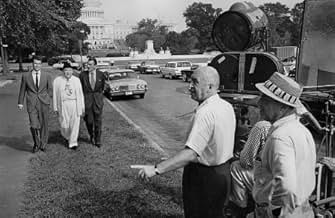Als der US-Senat einen für den Posten des Außenministers vorgeschlagenen Kandidaten überprüft, kommt ein Geheimnis aus der Vergangenheit ans Licht, das nicht nur den Kandidaten, sondern auch... Alles lesenAls der US-Senat einen für den Posten des Außenministers vorgeschlagenen Kandidaten überprüft, kommt ein Geheimnis aus der Vergangenheit ans Licht, das nicht nur den Kandidaten, sondern auch den Ruf des Präsidenten ruinieren kann.Als der US-Senat einen für den Posten des Außenministers vorgeschlagenen Kandidaten überprüft, kommt ein Geheimnis aus der Vergangenheit ans Licht, das nicht nur den Kandidaten, sondern auch den Ruf des Präsidenten ruinieren kann.
- Nominiert für 1 BAFTA Award
- 1 Gewinn & 2 Nominierungen insgesamt
Empfohlene Bewertungen
It was the first film in seven years for Gene Tierney and the last for Charles Laughton. Tierney couldn't have chosen a better comeback and Laughton a more fitting farewell.
It's up to the majority leader, Bob Munson (Walter Pidgeon) to get the President's (Franchot Tone) nominee for Secretary of State (Henry Fonda) confirmed, but it's not going to be easy.
Senator Cooley from South Carolina (Laughton) believes that Robert Leffingwell once had Communist ties and doesn't want him confirmed, even if it means digging up marginal people (Burgess Meredith) who claim to have known Comrade Leffingwell.
An ambitious, aggressive young senator (George Grizzard) loudly wants Leffingwell approved, and he will do anything to make it happen - even if it means blackmailing the chairman of the hearing, Brig Anderson (Don Murray).
There is pressure on the President to withdraw Leffingwell, and he refuses; the President puts pressure on Anderson to get him confirmed, and, sticking to his own principles, Brig, despite a tremendous threat to his home and political position, refuses to reconvene the hearing.
Meanwhile, if Leffingwell stays in and there's a tie, it will be up to the Vice President (Lew Ayres) as the President of the Senate, to break it.
This is a brilliantly done film that has you glued from the first moment to the last. It not only gives a vivid portrait of politics and how the Senate works but keeps the viewer in suspense for the entire movie.
The acting is magnificent. Franchot Tone gives a sturdy performance as a President running out of time; Lew Ayres underplays and makes sympathetic the role of the compromise Vice President; Walter Pidgeon is elegant and authoritative as the majority leader; Henry Fonda gives a straightforward, honest portrayal of a man who wants to serve his country but has to go against some of his own beliefs in order to do it.
There isn't a wrong note throughout, even down to a very young and pretty Betty White who has a tiny role as a Senator and Peter Lawford as a Jack Kennedy type.
Inga Swenson is the insecure Mrs. Anderson and gives a heartbreaking performance as a loving wife who feels she has failed her husband in some fundamental way.
Laughton is great, but he is given some very florid dialogue, and he rises to the occasion by hamming it up. It was an appropriate choice given the script.
Gene Tierney, as a wealthy widow/hostess who sees Pidgeon on the side, looks beautiful and gives a charming performance.
The end of this movie is incredibly powerful, and the scene with the President, Vice President and Senate Majority leader Munson is one of my favorites for a special reason.
In the book, the Vice President, who is terribly worried about the President's health, has an encounter with the President and then goes back to his office and expresses some emotion about the meeting.
Though the scene isn't in the film, Lew Ayres obviously read the book and has the same emotional reaction, but unspoken, on the Destroyer. Unless you've read the book, you won't pick it up, but it's an even greater scene if you have.
IMDb members have posted that nothing has changed today. In politics, I'm sure that is true. In films, unfortunately, things have changed.
A character-driven film rich in dialogue like "Advise and Consent" is hard to come by. See it and revel in the film-making past and shake your head at the timeliness of the story.
Gripping and long movie that contains over-the-top performances, engrossing drama , intrigue , corruption , political events and a special vision of US Senate and its behind-the-scenes Washington . Thought-provoking and stimulating film in which abounds top-drawer acting among the popular stars ; interesting screenplay from Allen Drury bestselling novel wheeling with a suspenseful intrigue about a controversial senator promoted to Secretary of State . When Allen Drury was writing the novel , John F. Kennedy, upon whom the character Senator Lafe Smith was based, was a young Senator with ambitions to be President. When the movie came out Kennedy was President, and Lafe Smith was played by Peter Lawford who was, at that time, married to Kennedy's sister Patricia . Main and support cast are very fine , there abounds magnificent performances as Don Murray , Paul Ford , Walter Pidgeon , Peter Lawford , Gene Tierney , Edward Andrews , Malcolm Atterbury and Franchot Tone , among others . Fascinating interpretation by Charles Laughton at his final movie , easily the most stimulating acting . Furthermore , stands out Henry Fonda who gives an adequate underplaying and the scene-stealing best , George Grizzard . Good production design by Lyle Wheeler , for the scenes taking place inside the US Senate, Columbia dusted off its senate set built for Mr Smith Goes to Washington. Appropriate cinematography in Panavision by Sam Leavitt , though also there is a horrible version being shown in computer-colored . Atmospheric and appropriate musical score by Jerry Fielding .
This engrossing , riveting picture was effective and compellingly directed by Otto Preminger . At the beginning he became a stage director and subsequently a notorious secondary actor . Otto directed several films , nowadays many of them are considered as classic movies . He made ¨Laura¨ that was released in 1944 and Preminger ranked as one of the top directors in the world . He realized all kind of genres as Court drama such as the great success ¨Anatomy of a murder¨, ¨Court martial of Billy Mitchell¨ , Noir film as ¨Laura¨ which made him an A-list director in Hollwyood , ¨Angel Face¨ , ¨Man with a golden arm¨, Religious drama as ¨The Cardinal¨ , Musical as ¨Porgy and Bess¨, ¨Carmen Jones¨ , Western as ¨River with no return¨ and historical as ¨Saint Joan¨, ¨Exodus¨ though also had some flop as ¨Rosebud¨ getting scathing reviews , though with ¨The human factor¨ won him respectful notices . However , his powers began to wane after and by the end of the decade of the 60s he was considered washed-up . ¨Advise and Consent¨ resulted to be one of the his best films . Rating : Better than average , Worthwhile watching .
Advise & Consent is a real ensemble piece. There are times when we will follow one character for a few minutes to see the part they would play in this vote, but it never locks in on one person long enough to have a true protagonist. This added to the element of surprise, making it even harder to predict which way the story might go. There were a number of powerful scenes that I loved, and those made up for some of the slower scenes where it felt like we were getting stuck in the tedium of Senate procedures. I did find that the end of the film was a bit too convenient, which made it seem contrived. It's certainly the appropriate Hollywood ending, but in real life it is rare that things would time out as perfectly as we see here. That being said, the story of Advise & Consent is still a good one, and this film feels entertaining and maybe just a little educational at the same time.
The movie version (more so than the novel) is as much or more about the practicalities of politics than it is about ideology. Some of the political issues themselves were hotly debated topics in the movie's own era, and a couple of them are still topical now, but even they are often secondary to the harsh and often unseemly realities of political power. All of the major characters have their flaws and make mistakes, yet all but a couple of them have some worthwhile characteristics. On its best level, the story is not about winning and losing so much as it is about the ways that political battles affect individual lives and personal character.
There are numerous good performances and some fine casting. Charles Laughton personifies the old-time Senator Cooley, Walter Pigeon (the spell-checker refuses to accept it spelled properly) could not have been better chosen as the Majority Leader, and Henry Fonda is perfect in a challenging role that calls for him to maintain a difficult balance. Even most of the supporting roles are filled well by fine actors like Lew Ayres, Franchot Tone, and Burgess Meredith (who uses his brief screen time very effectively, in a role that must have been quite ironic for him personally).
Naturally, some of the characters and events from the novel had to be omitted or streamlined, but there is still plenty of meat left, even once you discount the Cold War era ideological issues. The personal lives and personal agendas of the characters, the tension between their lives as individuals and their responsibilities as public servants, and the contrast between what they do and what the public sees, all give the movie some extra depth that makes it worthwhile and that gives it meaning that goes well beyond the political issues on the surface.
Wusstest du schon
- WissenswertesDirector Otto Preminger offered the role of a Southern senator to Martin Luther King Jr., believing that the casting could have a positive impact (despite the fact that there were no black senators at the time). King declined after serious consideration, as he felt playing the role could cause hostility and hurt the civil rights movement.
- PatzerWhen the roll call vote is being conducted on the motion to advise and consent to Leffingwell's nomination, Senator Van Ackerman's name is not called. Even though he had left the Senate Chamber, the clerk would still have called his name.
- Zitate
Johnny Leffingwell: The phone - Senator Munson.
Robert Leffingwell: Tell him I've gone out.
Johnny Leffingwell: Why?
Robert Leffingwell: Because, Johnny, he'll want to do some things that might obligate me.
Johnny Leffingwell: I mean why do you want me to lie? If you're in, you're in; if you're out, you're out.
Robert Leffingwell: Son, this is a Washington, D.C. kind of lie. It's when the other person knows you're lying, and also knows you *know* he knows. You follow?
- Alternative VersionenAlso available in a computer colorized version.
- VerbindungenFeatured in Henry Fonda: The Man and His Movies (1982)
- SoundtracksThe Song from Advise and Consent
Music by Jerry Fielding
Lyrics by Ned Washington
Sung Frank Sinatra - voice on juke box
Top-Auswahl
Details
- Erscheinungsdatum
- Herkunftsland
- Offizieller Standort
- Sprache
- Auch bekannt als
- Advise & Consent
- Drehorte
- Columbia/Sunset Gower Studios - 1438 N. Gower Street, Hollywood, Los Angeles, Kalifornien, USA(Studio, Senate Chamber - interiors)
- Produktionsfirmen
- Weitere beteiligte Unternehmen bei IMDbPro anzeigen
- Laufzeit
- 2 Std. 19 Min.(139 min)
- Farbe
- Seitenverhältnis
- 2.35 : 1






































